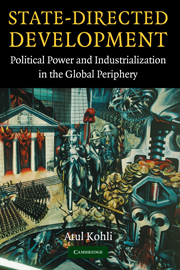Book contents
- Frontmatter
- Contents
- List of Tables and Figures
- Acknowledgments
- Introduction: States and Industrialization in the Global Periphery
- PART I GALLOPING AHEAD: KOREA
- PART II TWO STEPS FORWARD, ONE STEP BACK: BRAZIL
- PART III SLOW BUT STEADY: INDIA
- PART IV DASHED EXPECTATIONS: NIGERIA
- Conclusion: Understanding States and State Intervention in the Global Periphery
- Select Bibliography
- Index
PART II - TWO STEPS FORWARD, ONE STEP BACK: BRAZIL
Published online by Cambridge University Press: 05 September 2012
- Frontmatter
- Contents
- List of Tables and Figures
- Acknowledgments
- Introduction: States and Industrialization in the Global Periphery
- PART I GALLOPING AHEAD: KOREA
- PART II TWO STEPS FORWARD, ONE STEP BACK: BRAZIL
- PART III SLOW BUT STEADY: INDIA
- PART IV DASHED EXPECTATIONS: NIGERIA
- Conclusion: Understanding States and State Intervention in the Global Periphery
- Select Bibliography
- Index
Summary
Like Korea, Brazil by the end of the twentieth century was a middle-income country. Industry in Brazil had grown for much of the century, but at a pace that was often not as rapid as that of Korea. And more important, periods of growth were punctuated by periods of stagnation and even decline, especially toward the end of the century. The political underpinnings of this mixed economic record are analyzed in the next two chapters, focusing on the state's effective guidance of industrialization, as well as on the state's limitations. Among the political factors that enabled the Brazilian state to facilitate industrialization were early sovereignty, stability, rule by a narrow coalition of political and economic elite, and the relative competence and public-spiritedness of that elite. The Brazilian state thus shared some characteristics of cohesive-capitalist states and provided a secure and protected environment for capital, especially foreign capital, to make profits while generating industrial growth. Conversely, state power in Brazil was fragmented along the lines of the center versus regions and elites versus the masses; the ruling elite was not very nationalistic; and class politics occasionally emerged, forcing leaders to adopt populist economic programs. These tendencies of fragmented-multiclass states limited the capacity of the Brazilian state to mobilize domestic resources for economic development, often leaving the country dependent on foreign actors and resources for its development. As long as foreign resources were available, therefore, Brazil did well; when they dried up, Brazilian development went awry.
- Type
- Chapter
- Information
- State-Directed DevelopmentPolitical Power and Industrialization in the Global Periphery, pp. 125 - 126Publisher: Cambridge University PressPrint publication year: 2004



